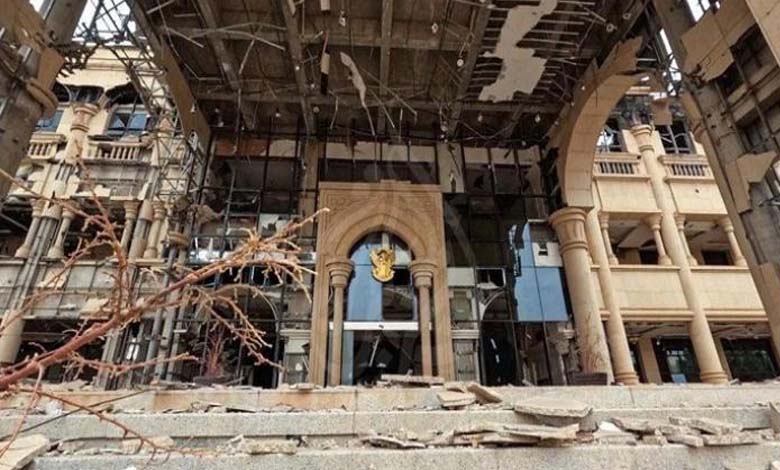Sudan between the Flames of War and the Map of Influence: A Struggle for Territory or Survival

Between control here and expansion there, Sudan teeters between the flames of war and the map of influence, with developments raising questions about the fate of the conflict.
While the capture of Khartoum represents a “turning point” in the struggle, with the infiltration of the “Rapid Support Forces” into other parts of Sudan and both sides attempting to form a government, analysts from CNN warn of the slim possibility of a quick resolution to the war.
-
“Rapid Support Forces” Welcome Washington’s Call for Sudanese Talks in Switzerland and Confirm Their Participation
-
The Popular Movement Insists on Including Rapid Support Forces in Negotiations with the Government
Since April 2023, Abdel Fattah al-Burhan, the head of Sudan’s armed forces, and his former ally Mohamed Hamdan Dagalo (Hemedti), leader of the Rapid Support Forces, have been engaged in a conflict that has so far claimed over 28,000 lives and displaced 11 million people, in what the UN describes as “one of the world’s worst humanitarian crises and displacements.”
The army claims to control vast areas of Sudan, but the “Rapid Support Forces” control most of Darfur, a region almost the size of France, and maintain a foothold in the neighboring states of West and North Kordofan, according to a map published by the army.
-
UN Concerns Grow Over Escalating Fighting in El Fasher Between Army and Rapid Support Forces
-
The crisis worsens in Sudan… 8 Months of fighting between the Army and Rapid Support Forces, What’s next?
Where is the next battlefield?
Speaking to CNN, Sudanese pro-democracy activist and researcher Hala Al-Karb believes that “the battle for territorial control could shift to Darfur, where the Rapid Support Forces are more concentrated.”
She pointed out that “Darfur is the stronghold of the Rapid Support Forces, which is why they are still fighting there.”
-
Deaths in renewed clashes in Sudan… Rapid Support Forces shoot down army aircraft
-
Sudanese army resorts to drones to halt Rapid Support Forces’ advance
The Army and the Tora Massacre
On Monday, many people were burned to the point that they were unrecognizable when bombs rained down on a crowded market in the village of Tora in Darfur, according to multiple local reports, as the Sudanese army targeted Rapid Support Forces strongholds.
The Rapid Support Forces posted footage on Telegram of charred bodies, accusing the Sudanese army of conducting a series of airstrikes targeting the market and nearby homes, resulting in over 400 deaths.
Volker Turk, the UN High Commissioner for Human Rights, expressed his “shock” at the reports, stating that 13 of the victims were from the same family. He added, “Civilians remain a very frequent target.”
-
Sudanese Support Forces Control Um Ruwaba as Fighting Intensifies in Khartoum
-
Rapid Support Forces tighten the noose around Sudanese Army headquarters
Reorganization or Division?
Political analyst Khaloud Khair believes that the army’s control over Khartoum “could increase Sudan’s division or make the Rapid Support Forces more willing to engage in negotiations.”
Previous negotiations mediated by the US, Saudi Arabia, and the African Union have reached a deadlock.
Khair told CNN that bringing the Sudanese armed forces and Rapid Support Forces back to the negotiating table will not be an easy task. She added, “This war has added a very ugly ethnic dimension to political and economic conflicts, and it will be difficult to resolve even with a national agreement.”
-
Sudanese Rapid Support Forces leader threatens to pursue Abdul Fattah al-Burhan and calls on the army to withdraw from the fighting
-
New Field Gains for Rapid Support Forces Disrupt the Sudanese Army
The Parallel Government
In February, the Rapid Support Forces took a bold step by creating a parallel government in the areas under their control, signing a charter with political and armed groups seeking to “establish a secular and democratic state based on freedom, equality, and justice.”
According to Khair, the state proposed by the Rapid Support Forces is “a quest for legitimacy,” and these forces may now “seek to control Al-Fasher” – the last major city in Darfur not yet under their control.
-
Following the al-Assad’s method, the Rapid Support Forces are bombing civilian areas with explosive barrels
-
Rapid Support Forces accuse the ‘Brotherhood’ of dragging Sudan into a prolonged war… Details
Al-Karb sees the Rapid Support Forces‘ attempt to form a parallel government as “a pressure tactic on the army to engage with them and legitimize themselves as a political force in any political talks.”
So far, the chances of negotiations leading to the formation of a coalition government between the army and the Rapid Support Forces seem slim, according to CNN’s analysis.
The division of Sudan remains a challenging objective, according to Sudanese human rights lawyer Mutassim Ali.
-
Dozens of officers surrender after the Rapid Support Forces tightened their siege on the army headquarters
-
Armed Forces and Militant Movements Supporting the Sudanese Army Sign Transitional Document












